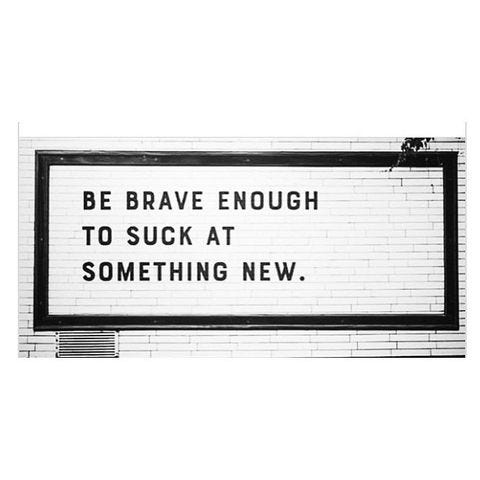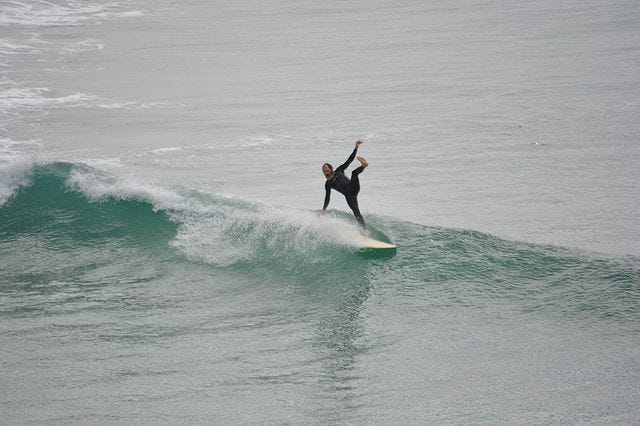#12: Why Would Anyone stick with something they stink at?
Finding joy in mediocrity + debunking growth mindset
In college, I signed up to an Arabic class. I enjoyed it until, a few classes in, I learnt that vowels were not spelled out in written Arabic, so I’d have to know and figure out words based on the context1. What’s the point? I’ll never be good at it, I remember thinking. I quit soon after2.
My beloved, for one, believes in hard work over talent and enjoys practicing skills that he doesn’t (initially) have a knack for, like coding or languages. I prefer to get better at things I already do well, but I reckon I’m missing out on potential fun and growth.
As I researched this post, several friends told me—with pride and amusement—how they stick with (and enjoy) things they suck at: playing music, drawing, ceramics, knitting, dancing.
My musical friend Soph, in Argentina:
“I suck pretty much at playing guitar and I play at least once a week. But I’m really over it. It's still fun.”
David, from France, on dropping self-judgment:
“I hated dancing for years, mostly because I felt ridiculous. And one day I realised: mastering a subject makes it lose all its flavour! Trying out a few steps, laughing, learning, that’s what I enjoy.”
Enjoying something you’re not good at seems counterintuitive. In previous pieces I wrote, I learnt that enjoyment and motivation feed off each other: for example, children who enjoy reading become better readers, and vice versa.
Today’s question is: Why do some people enjoy and keep doing things they’re not good at, while others feel self-conscious / like they’re wasting their time? (Asking for a friend.)
Debunking growth mindset
First, all my interviewees stick with things they stink at of their own accord; nobody’s forcing them to keep singing / skating / sewing.
Second, I turned to the growth mindset concept, studied and popularised by Stanford psychology researcher Carol Dweck. According to Dweck, people with a “fixed mindset” believe success comes from innate, set ability, while those with a “growth mindset” consider that success comes from hard work, and are more persistent and resilient after failure.
As a parent, I really latched onto this idea and have conscientiously tried to affirm kids’ efforts over outcomes. I should model failing and persisting at things! I thought. Surely, my perseverant friends have a growth mindset, but I have a fixed mindset and should work on it?
But several academics have warned that growth mindset isn’t all that it’s cracked up to be3. Brooke Macnamara, a psychology researcher at Case Western Reserve University in Cleveland, Ohio, is one of them.
In two meta-analyses published in 2018—combining results from hundreds and dozens of previous studies, respectively—she and her colleagues found that:
the relationship between growth mindset and academic achievement is “very weak”—so Dweck’s claim that students’ mindset “has profound effects on their motivation, learning, and school achievement” doesn’t hold water.
interventions to foster a growth mindset don’t really improve academic achievement and “resources might be better allocated elsewhere”.
In fact, in another 2018 paper, Macnamara and colleagues extend the warning to other popular concepts—like grit or deliberate practice—that play up the importance of hard work and the “malleability” of abilities:
“By overemphasizing the influence of environmental factors, we may unintentionally hold individuals accountable for conditions, events, or outcomes beyond their control, including learning disabilities and neurological disorders. […] Likewise, if deliberate practice is the overwhelming determinant of expertise, why should anyone who devotes thousands of hours of practice to a given sport not become an Olympic gold medalist?”
Undue pressure
Several interviewees mentioned wanting to get better, even if they never get really good.
Davy, in the UK, on skateboarding with his kids:
“I felt like I was missing out and I have been consistently inspired by their desire to do new things, their ability to learn quickly and to find the fun in everything […]. I know I am never going to be good at it (compared to people who have been doing it for years), but I like the challenge and the satisfaction when you learn something new.”
If you want to become, say, Serena Williams and you don’t have a lot of hand-eye coordination or you get injured easily, “maybe you’d be more fulfilled if you found some other endeavour that is a better match for you,” Macnamara suggests.
She adds: “We need hobbies and activities that give us enjoyment and fulfilment where we’re not putting undue pressure on ourselves. It shouldn’t be about your ultimate performance if that’s not what it’s about for you.”
Deliberately dismal
For more practical inspiration, I’m reading (It’s Great To) Suck at Something by Karen Rinaldi, a manifesto for “the power of practiced irrelevance” and “busting down the doors of perfectionism, workaholism, cool, and so many other false paeans to true success.”
In the book, Rinaldi celebrates not excelling as a form of liberation. We spend too much of our public life hiding or denying our weaknesses, she writes, seeking excellence at the expense of patience, humility and self-knowledge.
Her thing is surfing, which she picked up in her 40s:
“I suck at it. But, no matter. I have organized the last twenty years of my life around something that is the most difficult thing I’ve ever done, and something in which I will never, ever surpass mediocrity.”
Her experience resonates with the testimonies of my friends about the meditative pleasure of being out in nature or at the skate park, of not taking themselves too seriously, of enjoying time with their friends and family with no self-consciousness.
Rinaldi’s rules include:
“The thing you suck at has to mean something to you.”
“Do what you love without expectation of gain or reward.”
“The pleasure you find is in your own sucking at something, not in the sucking of others.”
And some of her advice for parents:
“Start small. You don’t need to make a big commitment or investment.”
“The beauty of finding something you can suck at is the freedom from having set goals that can cause anxiety. Appreciating this outlook will help you ease pressure in your kids’ lives too.”
“‘Mama’s going surfing,’ always seemed an absurd thing to tell my kids, which was part of the fun. It always made me giggle—like I was getting away with something. But everything I did afterwards, I did with more generosity in my heart because I had bestowed that generosity on myself.”
I’ll end on this quote from my Belgian friend Christophe, whose goal is kite-buggying hundreds of kilometres across Norway with a group of friends next March:
“I suck at it. We’ve been training for a long time but it’s really hard. It’s really a sh*tty sport: we spend hours waiting for the wind, untangling knots and falling on our faces, but then when we do manage it, we feel like the kings of the world.”
like you would, in English, be able to tell that trmp is trump or tramp depending on the sentence it’s used in.
and stuck with Spanish classes, which I am good at.
In 2017, a Huffington Post column quoted education scholar Luke Wood, from San Diego State University, as saying that growth mindset is a “cancerous” idea on its own:
“this myopic perspective perpetuates a cancerous idea that tells students you can succeed as long as you work hard, while depriving them from messages that affirm their abilities or recognize the external challenges such as racism and oppression that often inhibit their ability to do so.”









My thing I’m never going to be good at but enjoy is playing the piano. My parents were for some reason ok for me to keep having lessons, making little progress and fine about me opting out of sitting exams. I have no innate sense of rhythm and know in my early 40’s i’m not going to suddenly have that if I try a little harder...but it doesn’t mean I can’t get enjoyment from ‘mastering’ a new song. I am most of the time my only audience - I’m not playing for anyone else’s pleasure, but my own. Strangely I had a great aunt who took the same pleasure from playing the piano just for herself - no one ever heard her play, but they knew it was something she really got something out of right till the end in her mid 90’s. I would add that the other thing I have in common with her was being hard of hearing. Did those around us have lower expectations because of our impairment? Were we given a tacit permission to suck at something, just because we were perceived to be doing the ‘right thing’ by having a go. That in its self was seen to be good and there was never any expectation that we would be ‘good’ at it ? Who knows, but I’m glad to have something in my life that gives me pleasure with no expectation that I’ll ever master it!
Tania aquest d'avui és dels que m'ha agradat més sinó és el que més!